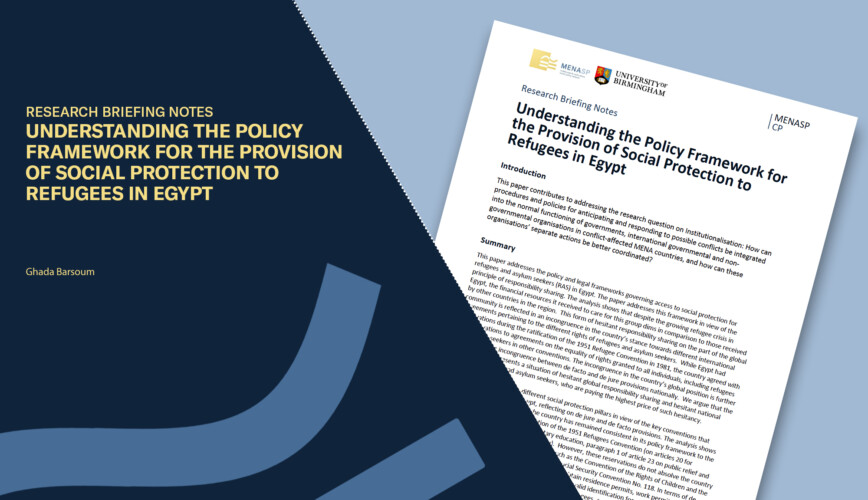This paper addresses the policy and legal frameworks governing access to social protection for refugees and asylum seekers (RAS) in Egypt. The paper addresses this framework in view of the principle of responsibility sharing. The analysis shows that despite the growing refugee crisis in Egypt, the financial resources it received to care for this group dims in comparison to those received by other countries in the region. This form of hesitant responsibility sharing on the part of the global community is reflected in an incongruence in the country’s stance towards different international agreements pertaining to the different rights of refugees and asylum seekers. While Egypt had reservations during the ratification of the 1951 Refugee Convention in 1981, the country agreed with no reservations to agreements on the equality of rights granted to all individuals, including refugees and asylum seekers in other conventions. The incongruence in the country’s global position is further reflected in the incongruence between de facto and de jure provisions nationally. We argue that the case of Egypt represents a situation of hesitant global responsibility sharing and hesitant national caring for refugees and asylum seekers, who are paying the highest price of such hesitancy.
The paper also reviews the different social protection pillars in view of the key conventions that were signed and ratified by Egypt, reflecting on de jure and de facto provisions. The analysis shows that from a de jure perspective, the country has remained consistent in its policy framework to the reservations made upon the ratification of the 1951 Refugees Convention (on articles 20 for rationing, 22 for access to free elementary education, paragraph 1 of article 23 on public relief and social assistance, and 24 on social security). However, these reservations do not absolve the country from its commitment to other conventions such as the Convention of the Rights of Children and the ratification of the ILO equality of treatment in Social Security Convention No. 118. In terms of de facto provisions, the cumbersome procedures to obtain residence permits, work permits, passport renewal, and the non-recognition of UNHCR cards as valid identification for some services pose serious challenges. Access to formal employment by refugees, a pre-condition to accessing contributory social protection as per the ILO Convention, is thwarted by excessive restrictions on the employment of non-nationals.
Theoretically, the paper contributes to a new genre of research in this area that seeks to bridge the gap between global support and national social policies.
DOI: 10.48352/uobxmenasp.0006
Author: Ghada Barsoum, Professor and Director of Master of Public Policy (American University in Cairo).
This project is supported by the Middle East and North Africa Social Policy Network (MENASP) at the University of Birmingham, in the framework of its ‘strengthening social welfare and security in the MENA region’ research programme, funded by the UK Arts and Humanities Research Council’s Global Challenges Research Fund.
Disclaimer: The opinions expressed in this publication are those of the authors. They do not purport to reflect the opinions or views of the Middle East and North Africa Social Policy (MENASP) Network or the University of Birmingham.
